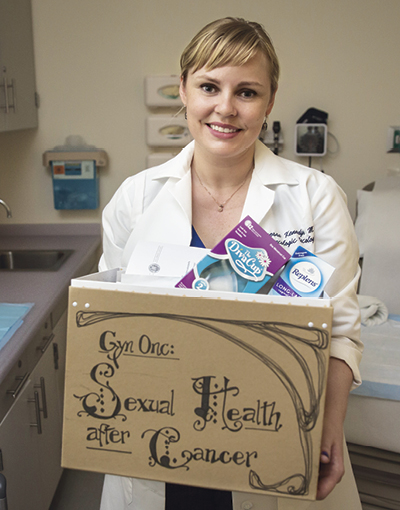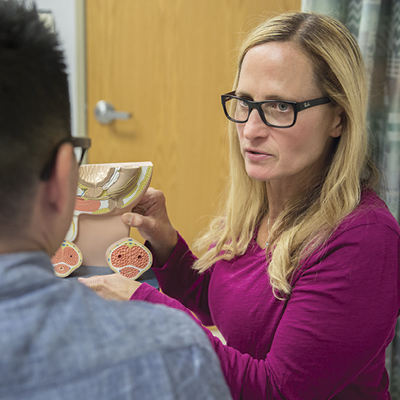Sexual health
after cancer

It’s not always a comfortable topic for either patient or provider, but many patients who undergo cancer treatment also experience difficulties with sexual function, which can hamper partner intimacy and harm relationships. Providers at UC Davis Comprehensive Cancer Center say these issues should be addressed at the outset of a diagnosis so that patients and their partners have the information they need to minimize the potential effects of cancer treatment even before treatment begins.
Synthesis spoke to two leaders in this effort: Paula Wagner, a certified family nurse practitioner in the Department of Urology who sees patients with prostate, bladder and rectal cancer; and Vanessa Kennedy, a surgical oncologist who treats women with cancers of the cervix, anus, ovary, vagina and endometrium, among others.
Vanessa Kennedy, M.D.

 What are the most common side effects of cancer treatment that affect female sexual function?
What are the most common side effects of cancer treatment that affect female sexual function?
A: Surgery, radiation therapy and chemotherapy affect female sexual function in a variety of ways. All may lead to premature menopause, which can cause thinning, dryness and sensitivity of the vulvar and vaginal tissues, and result in pain with penetration during sex or pelvic exams. Over time, this can lead to spasm and dysfunction of the pelvic floor muscles. Cancer treatments can also cause infertility, shortening and narrowing of the vagina. Physical changes are often accompanied by changes in body image and libido. Relationship strain and loss of intimacy are also common in romantic partnerships.
 What are some of the things patients can do to avoid or deal with side effects?
What are some of the things patients can do to avoid or deal with side effects?
A: A common misperception is that nothing can be done for sexual function concerns after cancer. In fact, many of the side effects can be addressed. Menopausal dryness can be treated with lubricants if the symptoms are primarily during penetration (I recommend coconut oil), and vaginal moisturizers if symptoms persist. Local hormone treatment is also an option for some women, depending on their individual cancer history. Vaginal dilators can help to regain vaginal length and girth after radiation therapy, and these come in a variety of materials, shapes and sizes. For patients with spasm and tenderness of the pelvic floor muscles, a course of pelvic floor physical therapy can be life-changing. I have a list of sexual health resources for patients. This includes information for finding a local sex therapist and/or pelvic floor physical therapist.
 How does a patient get an appointment with you?
How does a patient get an appointment with you?
A: I have a special clinic every other Friday morning for women with sexual health concerns who have had any type of cancer. To make an appointment, call the cancer center at 916-734-5959 and request an appointment with Dr. Vanessa Kennedy in the Gynecologic Oncology Sexual Health Clinic. Many patients have had pain with exams in the past, so the first appointment can focus on medical history and symptoms without an exam. While crucial to formulating the treatment plan going forward, the exam can be performed at the second visit. I want women to know that they are not alone in their symptoms, and that sexual health is just as important as the rest of their care.
Paula Wagner, C-FNP

 What are the most common side effects of prostate and bladder cancer treatment that affect male sexual function?
What are the most common side effects of prostate and bladder cancer treatment that affect male sexual function?
A: The most common sexual side effect of prostate cancer treatment is erectile dysfunction (the inability to achieve or maintain an erection), also known as impotence, which can result after surgery, radiation, cryotherapy and hormone therapy. Hormone manipulation, such as androgen deprivation therapy, also can affect libido (sexual desire). These potential side effects can lead to partner intimacy and relationship problems. Cystectomy, the surgery to remove a cancerous bladder, also can result in erectile dysfunction. We really want to talk openly and clearly with patients and their partners about their needs, and how things might change in terms of sexual function.
 What kinds of things can be done to address erectile dysfunction related to cancer treatment?
What kinds of things can be done to address erectile dysfunction related to cancer treatment?
A: I begin with a pre-treatment questionnaire to determine the patient’s sexual function prior to cancer treatment, and to collect information about other conditions that can affect sexual function, such as high blood pressure. At that stage we may also recommend penile rehabilitation therapy, which may shorten the recovery time of spontaneous erections after prostatectomy. This involves regular use of an oral therapy, such as Cialis, Viagra or Levitra before and after surgery. There are a number of other treatments for erectile dysfunction, each with their own pros and cons, including vacuum pumps, intraurethral suppositories, injection therapy and penile prostheses — all of which I can discuss with you and your partner before and after surgery.
 How does a patient get an appointment with you?
How does a patient get an appointment with you?
A: Call the Urology Clinic in the Department of Urology at 916-734-2222.
